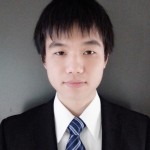
Soya Miyoshi
Tohoku University
Electrical, Information and Physics Engineering
Status: B2 Expected Graduation: March 2019
Research Host Lab: Zhong Lab, Electrical & Computer Engineering, Rice University
![]() Research Project Poster: “Complexity Analysis of Massive Wireless Imaging”
Research Project Poster: “Complexity Analysis of Massive Wireless Imaging”
Why Nakatani RIES?
Simply put, I was looking for a chance to put what I learned in school into practice. That is the reason why I chose to apply for this research internship program, not a learning-English program. Also, Nakatani RIES is the only program I could find that B1 students who do not have prior research experience are eligible to apply for.
In addition to that, I am interested in visiting Houston. I heard “Houston” is the first spoken word on the moon. Visiting Space Center Houston is my dream. I am also interested in Houston’s music culture, as it is famous for classical music. I would like to go to concerts by Houston Symphony and Shepherd School of Music.
Goals for the Summer
- Gain understanding of how research is conducted in the laboratory I will be assigned to. Try to know the field as deeply as possible.
- Improve communication skills. Especially, I would like to be able to ask questions even if I’m not confident in my English.
- See what I lack and what I need to do after coming back to Japan (both academically and personally). In my university, seniors will be given a chance to study in a laboratory. I would like to know what research I need to do before I become a senior.
- Know the city of Houston so that I can guide my Japanese friends in the future.
Excerpts from Soya’s Weekly Reports
- Week 01: Arrival in the U.S.
- Week 02: First Week in My Research Lab at Rice
- Week 03: Interview with a U.S. Researcher
- Week 04: Reflections on English Language & Life in the U.S.
- Week 05: Research in the U.S. vs. Research in Japan
- Week 06: Final Week at Rice & Research Poster Presentation
- Week 07: Visit to Washington, DC & New York City
- Final Report: Reflections on the Nakatani RIES Fellowship
Week 01: Arrival in the U.S.
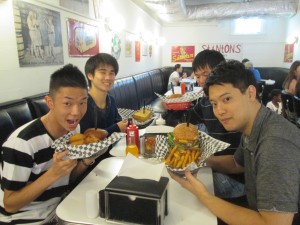
I arrived at the Sanuki Club hotel with my heart beating fast. Before leaving I had to say goodbye to one of my dormmates who will go back to his home country soon and I cried a bit in my Shinkansen seat. I was unable to relax on my train ride thinking about meeting the new people who also happened to apply to this program. I arrived at 2 pm and I searched for other Nakatani fellows for about 1 hour but it seemed I arrived too early. At 10pm in the lobby I spotted two U.S fellows and I could not stop myself from sitting next to one of them. Whenever I got tired of preparing for exams, I always enjoyed reading their weekly journals. So I guess I was creepy when I talked to him because I was like “Hi! I read your report!” even though he didn’t even know my name. Later, a Japanese fellow told me he was seeing the whole thing and because I acted and looked weird, he did not talk to me. That was off to a good start.
We had a discussion about cultural difference between the U.S. and Japan. Packard-san told us the difference of the definition of “home” between by American and Japanese people. When another Japanese fellow said he is interested in American culture, Rony asked him “what is American culture?”. I was surprised to hear that, but Rony explained that what shapes the U.S is a mixture of different culture from all over the world. So, it does not have the distinct “culture” that Japanese people think of what a culture is. The first day discussion was very insightful, which made me want to see what American culture is through my eyes soon.
One thing had been bothering me. I am the youngest among the Japanese fellows, which means my technical knowledge that will be required for the research internship program is limited. In July, I met up with Youssef and Haihao (they were doing research internship in Sendai at my home university). They are also sophomores as well, so I told them about my concern and I asked how they are doing research. They reassured me that I can just learn after my project is decided. They also told me that their mentors taught them things needed for the internship. So I was a little bit optimistic about it. However, at the Summer Research Colloquium, I kept being impressed by the presentation by all the U.S fellows. Both Youssef and Haihao got a poster presentation award, which made me proud of them, but at the same time I felt a little bit jealous. Youssef pressured me saying something like “it’s Tohoku power”.
How did you prepare for your research project at Rice before leaving Japan?
Before coming to the U.S., I tried to read the research papers published by the group I will be working with, but in retrospect, I did not have to do that. I will write about it later in my following report.
Question of the Week
I heard some American students do research from their freshman year. I also heard GPA is important for American students. How do they manage to do research when they are already busy with classes?
- U.S. undergraduates who do research during the semester typically do so on a part-time basis and work about 10 – 20 hours per week depending on their class schedule. Oftentimes, students will receive 1 – 3 credits for their semester research projects and receive a grade for this ‘class’ too. So, in a sense, research during the academic year is like a part-time job but to make progress in their research and yet still do well in their classes students must work very long hours at time and must become very good at prioritizing their time. If they spend too much time doing research they will do poorly in their classes and their GPA will go down which may make it difficult to get accepted into graduate school. If they don’t manage their time well and cannot come regularly to the research lab they will not make good progress on their projects and the host professor may not invite them back to do research again next summer.
Week 02: First Week in My Research Lab at Rice
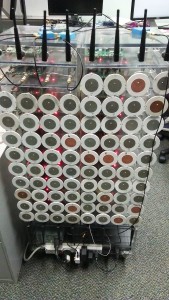
On the first day in the lab, we started off with deciding what I will do over the next 5 weeks. Two graduate students took time to explain about their projects. Both projects were impressive and interesting to me. Finally, it was decided that Mr. Abeer Javed will be my supervisor. He is working on the Argos project, which attempts to increase network capacity by scaling up the number of antennas. I told him I do not know anything about signal processing, so he gave me a book to read. My first week was mainly spent on reading the book about array signal processing and familiarizing myself with the software used in computing. I hope I will understand the fundamentals of this project soon and will be able to conduct research independently through this program.
On Thursday, I was invited to join the research group meeting. Professor Lin Zhong kindly let me introduce myself. The lab members also introduced themselves to me too. I was a little bit surprised that they took time to do that even though I am just a short-term intern. In each meeting, two or three graduate students give a talk about the status on their research project. Since everyone has their own research project, not everyone shares the same knowledge. So they sometimes ask the audience if they know certain technical details. I ended up raising my hand all the time when he asked. This meeting is held every Thursday, and I hope I will learn a lot about all the research in the lab.
Later, I was invited to a party by Kevin’s home, a grad student, which was a going-away celebration for someone who will be going to MIT. From this, I understood that a visiting student is treated as a member in this laboratory. Another graduate student in the lab, Pu Dong, even came to pick me up for the party in front of my hotel. I am so grateful for that. He told me a lot of things such as what it is like to be a graduate student in America, from the standpoint of an international student. It was really nice to learn about it from him.
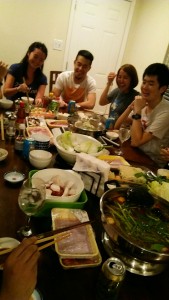
We all had Chinese and Japanese hotpot. I never expected that I would have hotpot in America. Sometimes I was asked if the Japanese hotpot is different from Japanese one. But it was delicious and I enjoyed the party. Even though I just met them a few days ago I was warmly welcomed and I am really thankful for that.
Question of the Week
I heard some students get paid for their research by their professor and some don’t. Why is the difference? What percentage of the grad students are “hired” by their professor? (“hired” is the word Mr. Pu described used to describe his situation)
- This may be because some students in your lab are PhD students and some are just enrolled in a Master’s program. Typically, in science & engineering, if you are accepted into a Ph.D. program you will receive tuition remission and a stipend from your advisor to work on research projects in their lab as you complete your degree. Some students also apply for external fellowships, the the National Science Foundation’s Graduate Research Fellowship, so they are self-funded for their doctoral studies. But, if you are just a Master’s student you less likely be funded and must either have your company/employer bay your tuition and living costs (some science and engineering companies have programs to do this) or pay for these costs individually. This is why, in the U.S., it is typically more financially advantageous for students to apply directly to a PhD program after they graduate from their bachelor’s degree. This way, they obtain their Master’s on the way to completing their PhD and can get funding for all years of their study. However, funding for doctoral students varies greatly based on field/department/program and the university you attend. Before you apply somewhere it is important you ask what the funding typical funding situation is for doctoral vs. master’s students in the program.
Week 03: Interview with a U.S. Researcher
I interviewed with Ms. Chin-Ya Huang and Mr. Pu Dong.
Chin-Ya Huang is a Visiting Assistant Professor from the National Central University (in Taiwan). She finished her Ph.D at the University of Wisconsin. She came to the U.S after she received her B.S from the National Central University. She decided to apply to the graduate schools only in the U.S. Her Ph.D research project was Wireless network resource management in next generation wireless network. She worked on Argos project, many-antenna base station project, at this group for 3 months as a visiting scholar. She plans to apply the knowledge she gained here to her project once she goes back to her home laboratory.
She talked about the different attitudes between graduate students in the U.S and Taiwan. She says, “In America, people are more, enthusiastic. It’s not that Taiwanese students are lazy. In general, -I don’t know if it applies to Japanese but I assume that it does-, students in Asia are more afraid of discussion. They do not tell their opinions by themselves. But in the U.S, people are always willing to talk, and I think, that makes a better research environment. Also, most of Taiwanese grad students want only master’s degree, because it helps find a better job. Only a few people want doctor’s because getting it takes time and few people are lucky enough to be a professor.” I told her the situation is exactly the same in Japan, and I asked her why she decided to get a Ph.D. “Simply, I liked it. Doing research and creating new things was just fun for me, it was like my hobby. It took 6 years to complete my Ph.D but I do not regret it at all. It was not easy of course, I saw some people give up. But my professor knew that, you know, the financial situations for international students were not easy, and we worked hard together.”
The second person I interviewed, Mr Pu Dong, is a graduate student in my research group. He enrolled in Xi’an Jiaotong University (in China) first, and he transferred to the University of Illinois, Urbana-Champaign (UIUC). After he finished his bachelor’s degree, he came to Rice. “I knew Rice, because some professors from Rice came to my university in China, and I kind of had a good impression about it.” I asked him why he did not continue his study in one place. “The reason is, I kind of got tired of staying in one place for a long time. You don’t know what you are good at and you like from the start. When I was in first year in my university in China, I was a chemistry engineering major, and in my second year, I changed to electrical engineering. But now I’m working on computer, although I did not know a lot about coding when I started studying here. When I was studying at UIUC, the research I was doing did not make me proud of myself, but the research project here, makes me feel good about myself. I think Rice fits me.” “My advice is, you should start with studying something basic. You need the ability to form logic. Take good classes, such as electrical circuit, electrical magnetism etc. They may not seem related to your future, but you don’t know, it may turn out interesting to you and chances are you’ll find your right path.”
Question of the Week
Why are there so many students in the U.S pursuing Ph.D degree? Indeed, being a researcher seems to be a dream job for us, but at the same time, there will be a risk that you will be overqualified for most of the jobs, if you decide not to be a research after you finish your degree.
- Keep in mind that many of the Ph.D. students in the U.S. are actually international students who may plan on returning home or moving to another country to pursue an academic career or research position after completing their students. Indeed, a recent Global Mobility of Researchers student that was conducted by Nature found that Japanese and U.S. researchers are the least likely to be working outside of their home country. Perhaps it is this propensity for citizens of Japan and the U.S. to only primarily seek out academic positions in their home country that, in part, leads to the perception that there are not enough jobs in academia or research. Students who are more open to pursuing career opportunities worldwide may find that there are more positions that they could possibly apply to. Second, not all Ph.D. students in the U.S. plan to go into academia or become a researcher. While this may be the top choice for most, you will find that many students are also considering or applying for positions in industry or other fields. Increasingly, universities are providing more advising to students on non-academic career paths for PhDs too including this very good resource offered on Columbia University’s Career Center website. If you search Google for “Non-Academic Jobs PhD STEM” you will find many other articles and resources on other career paths of Ph.D. holders as well.
Research Project Update
This week, I learned about beamforming a lot. (For the details of beamforming see this website). My mentor gave me a script that computes the angle of arrival (AOA) of signals in 2 dimensions (x & y). It uses ray tracing between source antennas and array antennas to simulate delay and sum beamforming AOA, the simplest way to compute AOA. Angle of arrival measurement is a method for determining the direction of propagation of radio-frequency waves. For details see the website above. I also tried to find related papers online. On Friday, my mentor took time to teach me how the script computes AOA in detail. Next week, I hope I will be able to simulate it in various situations, taking other factors into consideration.
Week 04: Reflections on English Language & Life in the U.S.
Using English in my Lab: Sometimes it is hard to explain my ideas because I studied math using only Japanese in school. Although I tried to learn English math words before coming to the U.S, explaining complicated things in a foreign language is not easy. However, I was relieved that minor English mistakes are not problems because my mentor listens to me patiently. Once I come back to Japan, I would like to continue to study more so that I will be able to explain my idea using math words smoothly.
On the contrary, I do not have a lot of problems listening to my mentor and my lab mates. Whenever I am discussing with my mentor, I always make sure that I understand what he means first. He usually talks very fast, but he is willing to explain in detail when I do not understand or I do not know about certain things.
Using English in my Daily Life: The hotel clerks are very friendly and it’s always nice to say hi to them. However, it’s very difficult to understand each other over the phone. One day, I asked them to pick me up at Kirby Starbucks, but apparently, they thought I was at a different Starbucks. Eventually, I went home by Uber.
Speaking of Uber, whenever the drivers of Uber call me and try to tell me their locations over the phone, it’s hard to understand too. When I had to go back home from the baseball stadium (Minute Maid Park) alone, the driver told me to come in front of a shop. But I had no idea where it was. Apparently, he did not understand what I said either. So I walked relying on the GPS on my phone. At that time, my phone battery was running out, so I was super relieved when I spotted the driver. In the car, he asked me how the game was. But English baseball jargon was not in my vocabulary so it was frustrating that I could not tell him how exciting it was! (Houston Astros won by back-to-back homers in the bottom of the 9th inning.) But he was listening to the radio so he knew about it already. I guess he knew how I felt. The traffic was busy after the game, so we talked a bit about Japan and America in the car. Since I learned economics and politics related words for English examinations, it was not very difficult to understand him when he talks about employment, politics etc. It is strange considering the fact that I struggled to talk about baseball.
The techniques I use to study/practice English: When I’m in Japan, I listen to the NHK World Radio news every day. The announcers speak very clearly, so it is easy to understand even though the words used are difficult at times. That’s another reason why I did not have a problem when the Uber driver talked about politics. In the U.S., I always make sure that I understand the meaning of jargon used in papers and the books that I read for my research project. I think it helps me not only understand the subject, but also improve my English too.
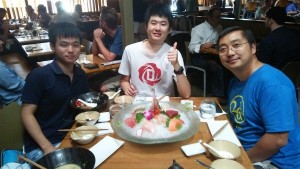
Other than that, I am not doing something special to improve my English here. It is partly because I don’t like the idea of talking to somebody to practice English. In my opinion, if I do so, I would sound more “foreign” and unnatural. It is impolite to do, too. Although unintentional, when speaking in a foreign language, sometimes people do things that they usually don’t. So, I am always careful when speaking here in the U.S . Before saying something in English, I think twice; would I say that in Japanese?. However, when I went eat lunch with my professor, at first I tried to speak politely, but as the conversation went on, I found myself talking to him like a friend. This is something I would never do in Japanese. English does not have a distinct polite form of words, so it is difficult to speak in a formal way as a non-native speaker. On the first day, he told me that he is my “peer” and I can talk to him without being overly polite, though. He seemed curious about Japanese culture and we talked a lot about the difference between China and Japan. It was very nice to have lunch with him, however, I still wonder; should I have talked about something else? But he did not seem like he wanted to talk about research at lunch, (he may have just wanted to talk about something fun) so I am just assuming it was fine.
Question of the Week
What are the rude things Japanese people do when we speak in English, from American’s standpoint? Also, in America, if I speak politely, then does that mean I am creating a distance between the person who I’m talking to? To what extent I am expected to be “polite”?
- It can actually be very hard for a Japanese student to be perceived as rude in America and one of the key reasons is what you discussed before. Because there are both formal and informal words/phrases in Japanese, whereas in the U.S. our English is very informal, Japanese students tend to spend a lot of time asking themselves “How should I say this politely in English?”. Because you are actively thinking about how to say things in the best way, it is very unlikely you would say something that would come across as rude. This is one example of how language in and of itself can reflect the culture society of its speakers. It is far more common for an American student in Japan to be perceived as rude because they may speak in a too direct or too informal manner as this is how we typically speak in English in the U.S.
- What is more likely to happen is that Japanese students may stop or pause in the middle of the conversation to think about the ‘best’ or ‘most polite’ word or phrase to use. However, to an American, we are not used to silences in our conversations so the person you are speaking with might interrupt this pause or silence and ‘jump in’ to ‘help’ you with a suggestion of the word or phrase they think you are trying to look for or find. This can then cause the Japanese student to get a bit frustrated as they didn’t need help or a suggestion as much as they just needed an extra moment to think about what they wanted to say. The American has the good intention of wanting to help and from the Japanese student’s perspective their good intention is to want to say things in the most appropriate way. However, both sides can feel a little frustrated with conversations like this. These cultural differences to how we use/speak a language can sometimes lead to communication misunderstandings or breakdowns.
- To your second question, yes, it is possible that if you speak in a too polite or too formal way you might inadvertently cause distance between you and the person you are speaking with. Take your lunch with Prof. Zhong as an example. He was very interested in learning about you as a person and hearing about your experiences in Japan and he was speaking in a very informal way with you as Americans tend to do this to make the other person feel more comfortable or at ease. However, to a Japanese student speaking very informally with a professors can be more uncomfortable so you may naturally feel inclined to want to respond in a very polite or formal way or redirect the conversation to research. But, if you were to have continually tried to change the subject to a safe or expected one, like research, you may end up distancing yourself from the person you are talking with who was the good intent of wanting to get to know you better. So you did the exact right thing by speaking with him about these informal topics and sharing your personal experience and perspective as that is what was polite and excepted for that conversation (even if these are things you probably would not talk about with your professor in Japan). Understanding that in the U.S. we tend to use informal conversations, small talk, or discussions about non-work/non-research aspects of our lives as a way to make the other person feel more comfortable or at ease and to build connections with others is also an important part of understanding how language can reflect our cultural or societal values.
- You may also find this article by the Harvard Business Review helpful on “The Big Challenge of American Small Talk”. It discusses how differences in small talk and informal conversations in U.S. English can cause challenges for international expats when they are trying to communicate in a professional setting in the U.S.
Research Project Update
This week, I tried to simulate the minimum variance beamformer, another way of calculating the angle of arrival. (See my previous report for details) By using the technique, instead of delay-and-sum on reception, reduced aperture, higher frame rates, and increased depth of penetration can be achieved without sacrificing image quality. The next step is to calculate complexities of 1D (x,y), 2D(x,y,z). Complexity means, simply put, the amount of calculation to process a set of data from sources to arrays. For example, if the number of antennas increases, so does the complexity.
Next week, my mentor will take a break and go off to New York, so I will do all the calculation independently.
Week 05: Research in the U.S. vs. Research in Japan
The following is just based on what I heard; it may not necessarily apply to every laboratory in the U.S (or in Japan).
The difference I discovered (between the laboratories in the U.S and Japan)
In RECG, the research group I am working with for this program, the professor is NOT like a “Sensei”, or teacher. Prof. Lin Zhong does give their students his feedback on students’ research project, but does not not issue orders. He does not tell them what to do; “Because I’m not a boss!” said Prof. Lin, “In our group, everyone has a different project, and he/she should know more about the field than me. For example, Abeer knows more about Argos than me, then how can I tell him what he should do next? All I do is to give everyone my feedback. I want my students to learn to do research independently.” Ruogu, a visiting student from Peking University, also said “At first, when I started doing research in this group, I was confused because I had to figure out what to do by myself. Now I know how to start research, though.”
However, in Japan, from my observation, a professor is considered to be in a higher position. The word “Sensei” seems to imply everything; A Sensei gives direction to their students since a Sensei is expected to know everything about the field and teach his students. One Sensei in my university said “I have one D3 student who is struggling to write his thesis. He needs to publish at least one paper to graduate, but his project is not going well. I am doing my best to support him, though. He has been working hard, so I don’t want him to give up.”
When I told Lin about the Sensei at my university, he said he probably wouldn’t “support” his students like the Sensei does. In REGC, instead of having much more freedom of research, each student has to be more responsible for his project. Lin told me that not all laboratories in the U.S are like this, but professors in Asia prefer “teaching” his students, in general. Lin says “But in America, every group is different. So you should carefully think about whether you will be able to work well in the group when finding your advisor.”
In RECG’s meeting, everyone is argumentative and sometimes gives critical comments on others’ research. In response to these comments, the person who is questioned counters with detailed explanations, which always impresses me. But I wondered why people are being like that in the meeting even though Lin and the students here usually seem to be kind and friendly. “Why is Lin so mean in the meeting?” I asked Pu, one of the graduate students. “He is not being mean. He just wants everyone to do better.” He said. And I realized that all of the seemingly scathing comments are in fact constructive. It reminded me of what Lin told me on the first day; “In this group, everyone is a peer.”
Research Project Update
This week, I calculated complexities of 1D(x) and 2D(x,y) Capcon’s method (Minimum variance beamforming method) and considered what factors have the biggest influence on the complexities. About what complexity is, please see my previous journal. I learned that the number of antennas, the number of intervals of angles the antennas examine (which determines the resolution) and the dimension affect the complexity of the algorithm. The more complex the algorithm gets, the more run-time and space it requires. Minimizing complexities leads to the higher frame rate.
So, next week is the last week in the lab. It feels like yesterday that I met my mentor on the first day in the lab. Although there are a lot of things that I must say, I will save it until next week. Now, it is time to get ready for the final poster session.
Week 06: Final Week at Rice & Research Poster Presentation
I told a friend of mine in Japan that I was having a hard time in my lab. He replied me in a way that I didn’t expect. “You love studying, even during summer vacation.” He did not say that to praise my effort. Rather, he was being sarcastic.
It got me thinking; Why am I doing all this? In front of my computer (that has a cracked screen), struggling to make progress, I imagined how my friends are having fun in Japan. Also, some of my other Nakatani friends said something similar to me. “It’s great of you to spend your second-year summer break to do research. I was just having fun back then.”
“I can’t give you a definite answer if you ask me why ”, I answered to my own question. On March 6th, I went to the educational affairs office because I had a document that I had to submit. Then, I saw someone of the office inserting a flyer into the file titled “study-abroad information”. I took the flyer out, and it read the deadline for a summer internship program was extended from March 1st to 10th. I immediately got interested. I even felt as though it was destiny. “Why not?” I thought. “Even though there is a chance to experience new things, why not?”
However, the application and preparation process seemed like a hurdle that I had to overcome to make it to America. Putting my vague I-want-to-go into words was never easy. I did not sleep three hours a day until I submitted it. The visa application was confusing and time-consuming. On top of that, I struggled in my lab.
Nevertheless, I don’t regret my first decision to apply to this program. First, I met many people. It has been great to hear whatever stories or advice they gave me. Second, I developed an interest in a different culture and language. In particular, I had the chance to learn not only about America, but also China. Third, I got to know about the life of a Ph.D. student in America. Fourth, I learned a lot about the Argos project and the technology that helps our lives directly.
Most importantly, I felt so frustrated with myself in the lab. One time, my mentor gave me a quiz that was related to my project. I cannot forget his disappointed face when I jumped to the conclusion intuitively. One third-year visiting student from Peking University was giving a talk in the group meeting. His project seemed so advanced, and his English was ten times better than me. There were also so many other things that made me feel frustrated about myself, which I think were great experiences. I will go back to Japan with the determination that I will study with a sense of purpose.
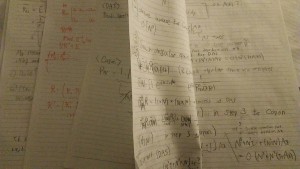
Also, I realized that research is a fight against myself. Whenever I got stuck, I was able to ask my mentor for advice. However, he did not always have someone to ask for an immediate answer. He had to sit in front of his computer all day and think by himself. Jumping to conclusions (like I did) is out of the question. When I told Keiko-san about it, she agreed and said that you have to be mentally strong to do research as a P.h.D. student.
Looking back, I wish I could have contributed to my mentor’s research more. I spent my first three weeks mainly learning about the beamforming techniques and its algorithms. I only found the complexities of two algorithms used for imaging, which my mentor says is enough for a five-week internship.
However, when I was packing my luggage the last night in Houston, I found a lot of items that I got while I was here. All of these reminded me of the people who I talked to and the places I went. I looked through the notes I took in the lab. The scribbles all over the pages caused me to remember that I was trying my best. “I may not have made an impressive discovery in my research,” I said to myself. “but I learned a lot.”
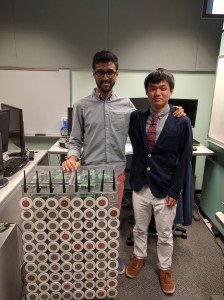
Final Research Project Update
![]() Research Project Poster: “Complexity Analysis of Massive Wireless Imaging”
Research Project Poster: “Complexity Analysis of Massive Wireless Imaging”
My research project was radio frequency wave imaging and analysis of its complexity when processing signals. If we process an image using radio frequency wave, we will get beyond what is possible with traditional cameras. For example, we can get phase information. Also, in our project, we try to increase the number of antennas at the receptor to increase the resolution of the image. However, if we increase the number of the antennas, we will get more complexities of the algorithm. Complexity is a measure of the amount of time and space required by an algorithm. If we have increased complexity, we will have a poor frame rate. Our goal is to get a frame rate of 60Hz, the maximum that human eyes can see. So, I mathematically analyzed the complexities of two algorithms of signal processing. I found that the Capon method, although it can achieve better resolution, has a higher complexity. Our future work is to do the calculation in a distributed manner. It is reported that doing calculations in a distributed way reduces complexity in many algorithms. We expect that it will lead to reducing the number of time samples that have to be sent to the central processor T, making the frame rate higher.
Week 07: Visit to Washington, DC & New York City
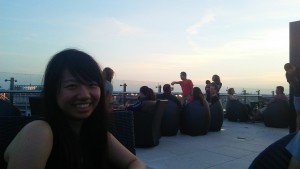
I couldn’t believe that the five-week internship has ended. But when I was relaxing in the rooftop of the Hampton Inn hotel in Washington, DC with Unong-Chan, all of a sudden, I felt a sense of accomplishment. Unong-Chan said she felt the same way too. She even said, “My life goal achieved!” And we chuckled, we probably wanted to congratulate ourselves on our hard work in Houston.
We visited many places. Honestly, I do not know which one I should write about. It is so generous of Nakatani Foundation to fund our sight-seeing. I even felt guilty all the time.
On Sunday, September 18, I visited some of the most famous museums in the world. Especially, as an engineering student, I was excited to see the Wright Flyer, the very first successful aircraft designed by the Wright brothers. I wondered what was it like to be the first humans to fly in the air? Were they proud? Were they excited? Were they afraid? The view from the first aircraft must have been special. More than that, what was it like to achieve something that great? Trial and error is essential for innovation. However, it was not until their aircraft actually flew that all of their efforts became worth it.
On Thursday, September 22, we visited Columbia University. Columbia is one of the leading research universities in the world and here, especially, the history of its physics program can be traced back to more than 150 years ago. Many scientists received a Nobel Prize for work done while on the faculty at Columbia University. Knowing these facts, I was in awe standing in front of the entrance of Pupin Hall. I was given the chance to visit laboratories in the department of Computer Science. Four graduate students took their time to tell me about their research. One of the Ph.D. students talked very passionately about his research. He said “At first, my professor was doubtful about my project. But I was very serious, and I believe my findings are significant. I’m sure you will see my achievement of my research in your daily life soon!” There was a master’s student from Kyocera, a Japanese multinational electronics and ceramics manufacturer. He said “This department has a strong ties with industry. So, everyone wants to get a job in the world’s leading companies such as Google. Many people come here to learn and develop the latest technology.”
There are too many things that I want to write about. But if I do write them all, it will be long as a book. So I decided to show you the some of the many pictures I took this week.
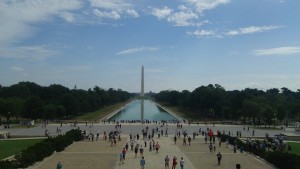
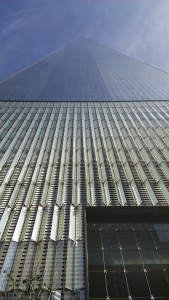
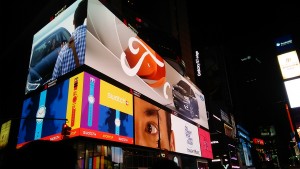

Final Report: Reflections on the Nakatani RIES Fellowship
What people tell me most frequently is “Sugoi!”(you are great, impressive). I guess they mean “you are great because you did research (using English).” Whenever I hear this, I find it a bit off as I didn’t do anything Sugoi at all.
As soon as I got back to Tokyo from New York, I met up with my best friend from high school. He also said “Miyoshikun, Sugoi” too. But seeing him took a weight off my mind. I decided that I would not pretend that I achieved something great, although it was easy as he did not know about my “research” field at all. I told him, “sometimes it was hard, but I had a great experience.”
Here are the reasons why I don’t feel like exaggerating.
First, as I wrote in my previous report, I did not do research in a way that graduate students do. This program was really an internship for me to learn things. So if you are interested in applying to this program and reading this now, I would say to you that you do not have to be Sugoi at all. All you need is enough passion, as you will have to sort of give up your summer break to participate in this program.
Second, about the “using English” part, I don’t like it as learning English was not the primary objective of this program. However, some people including my mother assume that I became Perapera (fluent) in English through the 5-week-internship. When my mom asked me how confident I became about using English, I did not know what to say, honestly. As I clarified in my previous report, I made it through by asking questions to make sure I understood. I was not fully able to communicate my ideas as smoothly as she expected. I told her that I felt the need to continue to study if I wish to study in America for graduate study.
Sadly(?), this is the end of my reports. To conclude, please let me write about something a bit personal. So, there is this person who writes so well that I read all of his entries. “I wish I could write just like you do,” I said to him. Ever since I was 11 years old, I liked to write. Writing is one of a few things that I thought I was good at. However, though I hate to admit, my reports leave a lot to be improved, partly because I did not have enough time to polish my sentences. There were so many other things that I wanted to tell the readers. But my limited vocabulary prevented me from pouring my soul out.
I wish I could. The readers might now realize that I keep saying the phrase or something similar all the time. If you look at it positively, you may say that I am hardworking. But I think I just compare myself to others too much and trying to do more things that I can do. Because of this, sometimes I end up wasting my energy and time as I don’t know how to be clever and not able to stop myself from “trying”. At this point, I do not want the readers to misunderstand what I mean. I don’t regret that I spent my summer break at Rice at all, and I do think I had a life-changing, great experience there.
“Doing research is hard.” Keiko-san, a Ph.D. student at Rice, said. “But don’t push yourself too hard, just go with the flow. Miyoshi-san, you should just do what you are able to do. When I was doing undergraduate intern, I felt the same way you do too, though. But I just did what I was told and sort of waited until I found something right for me.”
